#a heidelberg holiday
Text

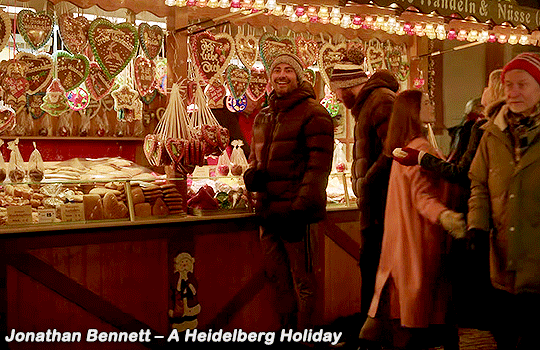






Cameos in Hallmark Channel's Countdown to Christmas 2023
#hallmarkedit#hallmark cameos#the santa summit#a heidelberg holiday#a merry scottish christmas#haul out the holly: lit up#our christmas mural#a biltmore christmas#magic in mistletoe#sealed with a list
44 notes
·
View notes
Text






december in movies
[12/31]: a heidelberg holiday (2023) dir. maclain nelson
♪ Hear the bells ringing, hear the kids singing
This is how it should be
When the snow's swirling and the fires burning
I can finally believe ♪
#filmedit#filmgifs#moviegifs#cinematv#filmtvcentral#filmtvedit#fyeahmovies#doyouevenfilm#mediagifs#dailytvandfilm#christmas#A Heidelberg Holiday#mine*#mygifs#movies*#dim*#this is me being totally lazy and posting this super late#worst thing is; the movie's super short hahahaha#anyway I LOVED it#super cozy and cute and some gorgeous places; a bit too much of aerial shots but aha#I want to live in that town!
7 notes
·
View notes
Text














#a heidelberg holiday#countdown to christmas#hallmark channel#first look#photo preview#ginna claire mason#frederic brossier#hallmark movies
8 notes
·
View notes
Text




A Heidelberg Holiday
5 notes
·
View notes
Text
Hallmark says it’s chill if you only see your new boyfriend one month a year as long as it’s December
4 notes
·
View notes
Text
A Heidelberg Holiday (2023 Hallmark Movie)
A Heidelberg Holiday (2023 Hallmark Movie)
#AHeidelbergHoliday #Hallmark #ChristmasMovie
A Heidelberg Holiday (2023 Hallmark)
📺. Stream/Watch the Movie (Ad): Watch or Stream via Hallmark Movies Now
Cast: Ginna Claire Mason,
Director: Maclain Nelson
Writer: Maclain Nelson, Frédéric Brossier
➡️ Check out our Youtube Channel: Lifetime Uncorked: Lifetime Movie Reviews
🎧 Listen to the Lifetime Uncorked Podcast: Listen Now
🍷 Support the show with a $5 tip:…

View On WordPress
#2023#A Heidelberg Holiday#Christmas Movie#Frédéric Brossier#Ginna Claire Mason#Hallmark#Hallmark Channel#Hallmark Movie#Maclain Nelson#tv movie
0 notes
Text

drinking coffee, watching skateboard videos, listening to townes van zandt and marveling at clarice and her sass or happy tuesday imaginary constructs
happy mumblelard post number three thousand oh my or keep passing the open windows imaginary constructs
#long lovely weekends are lovely#sweetwater creek#supermercado pollo al carbon#krink#maps#slappers#sleepovers#mason mill#collages#cassiby#clarice#ruth#giggling in the windowsill#grabbing onto the weeds to keep from falling off the edge of the world#stranger than fiction#shiva babies#heavy metal parking lots#heidelberg holidays#past lives#won't you lend your lungs to me#mine are collapsing#and that would fix everything#end of messages
27 notes
·
View notes
Photo

#Repost @jadsneij • • • • • • Heidelberg, Germany 🇩🇪 Heidelberg diaries pt. 1 Inviting alleyways 🌇 #heidelberg#germany#toursit#vacation#holiday#travel#traveling#travelphotography#city#oldcity#cityphotography#alley#streets#oldstreets#buidlings#germancity#architecture#architecturephotography#life#people #Ukrainewillwin https://www.instagram.com/p/ChJiZcrMAcs/?igshid=NGJjMDIxMWI=
#repost#heidelberg#germany#toursit#vacation#holiday#travel#traveling#travelphotography#city#oldcity#cityphotography#alley#streets#oldstreets#buidlings#germancity#architecture#architecturephotography#life#people#ukrainewillwin
3 notes
·
View notes
Text
#heidelberg#germany#europe#europetrip#europetravel#europe trip#europe travel#VisitEurope#travel#tourism#trips#holidays#vacation#travel tips#travel guide#travelgram#traveltheworld#things to do#things to see#places to go#places to see#places to travel#places to visit#travellover#traveladdict#DiscoverGermanyFromHome#visitgermany#germanytourism#ExploreHeidelberg#TravelHeidelberg
0 notes
Text
Don't Ask (Cake)
@hws-anthology
Here is my contribution to the Anthology! Its gerame (again), but I challenged myself to write Monika/Amelia this time.
Rating: Teen
Word Count: 5390
CW: some cursing
Amelia and Monika can both be very stubborn. Once they’ve decided something, it can be hard to change their mind. On this day, they will settle the ultimate debate: is zucchini bread ‘bread’? Also, can you make chocolate cake with sauerkraut?
It was a lovely morning in Heidelberg, Monika’s favorite kind. She had time to sit on her balcony with her morning coffee and people watch in the square below. Cafes began setting out tables and chairs. Students rode by on their bikes. A farm truck arrived to set up their fresh asparagus stand.
The air was cool, but her coffee mug kept her warm as she watched, silently absorbing everything. The gentle wind ruffled her hair, and she pulled as much as she could into her lungs. Even as she exhaled that individual breath, she hoped she could carry with her the calm she felt from it for as long as possible.
Maybe it could be a source of strength for the day she was about to have.
She had fifteen more minutes of this before her company woke up. They were both morning people, but their approaches to the morning were very different. Monika reveled in the time she had between fully asleep and fully awake. After she was alert enough to make coffee, but not before she remembered all the important emails she probably had waiting for her. It was a kind of refuge.
Her girlfriend felt the opposite. Amelia resented feeling unproductive, especially when she was awake and moving around. She was convinced that if she was alert enough to walk in a straight line and remember where the coffee maker was, she should be able to get work done. In practice, this wasn’t true. Amelia’s solution was to pretend the middle ground didn’t exist anyway.
She had left the balcony door open behind her, so her view was unobstructed when Amelia decided to slide into the adjacent kitchen on her socks, still in her sleep shorts and an oversized t-shirt.
“You almost knocked over my philodendron,” Monika says affectionately.
“Mornin’ to you too, darlin,” Amelia smiles, and wraps her arms around Monika’s shoulders. With most people, this would be a gentle move. One you do slowly, sensually, sweetly. Amelia manages to make it feel like a running jump hug, the kind that knocks over reuniting couples at the airport. She leans over Monika, her weight pressing down on her shoulders so they sway back and forth together. Monika thinks it's equally sweet. Despite being 25 cm shorter than Monika, Amelia’s hug feels like a weighted blanket.
Until Amelia leans down to Monika’s ear and whispers, “Do you remember what day it is?”
Monika pretends she doesn’t hear her, breathing in the strawberry scent of Amelia’s shampoo.
“I know you heard me, babe,” Amelia kisses her hair, “you know what day it is.”
“April 25th,” Monika says.
“Aaaaaaand?” Amelia prompts as she moves towards the kitchen.
“It’s a Tuesday?”
“Aaaaaaaaaaaaaand?” Amelia prompts again, louder this time. Monika sighs as she watches her girlfriend grab a travel mug from the cupboard.
“And nothing,” she says firmly, “there is nothing else to make this day significant here.”
Amelia is unphased by Monika’s stalling, “Oh ho ho, but at my house there is!” She’s beaming as she fills the mug with coffee.
Monika groans. Amelia slides back towards the bedroom, probably to get dressed.
“What holiday is it?” she calls back.
Monika holds firm. “National Zucchini Cake Day!” she yells.
“It’s Zucchini Bread Day!” Amelia rushes back, already wearing a polka dot dress. Her arms are crossed in an X. She’s pouting.
“That’s disputed,” is all Monika says. As she passes by to get ready herself, she makes sure to lean down and give Amelia a kiss.
They really only need zucchini from the store, but they like to go over the whole recipe anyway. Monika has most of the ingredients already because she uses them often, so they agree there’s no harm having more.
“All purpose flour, though?” she asks, “You’re sure we don’t need bread flour?”
Amelia shoots her a dirty look. “You can make bread with the normal amount of gluten, too,” she says, “you can even make it gluten free!”
Monika is enjoying this, though. “I’m telling you, calling it bread is an insult to bread. Real bread is raised with yeast, not baking soda.”
“You were raised with yeast,” Amelia shoots back indignantly.
Monika brings a finger to her chin, “I suppose. I was raised with yeast in my bread, that is true.” She smiles at her girlfriend grabbing a bag of chopped walnuts and some packets of baking powder.
Amelia stands proud, chin raised, shoulders back. It’s a move she’s pulled off many times at nation meetings. Despite her being relatively short among their kind, she’s never had trouble making her presence known. However, standing here in this Rewe, with her arms full of the core pillars of most baking recipes, her posturing is unbearably cute. “I cannot allow zucchini bread to be defamed on its national holiday,” she says, as seriously as she can manage outside of international affairs. Her mouth twitches the way it does when she’s trying very hard not to smile.
“Of course not, and I would hate to cause offense.” Monika walks serenely down the aisle, turning her nose up a bit as she passes Amelia. Amelia’s lips twitch harder.
Perhaps the bait was a little too good. Suddenly Amelia drops everything in her arms to lift Monika up in a bear hug. The bag of flour explodes a little on the floor. Everything else is mostly fine. Monika laughs out of surprise at first, and keeps laughing at the absurdity. Why or how, logical consistency, they lost their meaning when Amelia was in a good mood. They get some odd looks, and Monika would normally care more, but Amelia is completely unconcerned and Monika is laughing too hard. They are too happy to care how they look to other people.
There are relatively few hiccups on the way back to Monika’s apartment, but they have begun debating chemical leavening versus yeast again. It is the central debate of this entire experiment. Can something be called bread if it doesn’t use yeast? Is zucchini bread really bread?
“I would argue yeast leavening is a kind of chemical leavening though,” Amelia waves her hand between them as Monika searches for her loaf pans, “I mean us too — well maybe not us us — but organic life like yeast has chemical reactions goin on all the time. Yeast fermenting starch to create gas is chemical. Ergo, yeast is a chemical leavening agent just as much as the baking powder in zucchini bread is.”
“While that is objectively correct,” Monika says slowly, “I would argue then that perhaps it should be called “artificial leavening” instead of chemical. Yeast is an organic method, while baking powder and sodium bicarbonate are inorganic. None of that changes the fact that the different results produced by these methods are how we categorize cakes versus breads. The taste, the texture. They are not the same.”
They’ve gone in these circles before, but today is different. Today will be the first time Monika tries zucchini “bread” for herself. Today, this debate ends. One way or another.
They probably should’ve picked up another pan at the store though.
Amelia looks at the one loaf pan Monika has laid out beside the ingredients, “Alright, you have to have more of these. I coulda sworn you had five or six at least. What’s up?”
Monika sighs, “Julchen.”
This immediately piques Amelia’s interest. Those two were so alike sometimes. Too alike. Monika is sure that if Amelia had been there for Julchen’s scheming that day, she would’ve wholeheartedly gone along with it. Even now she is wary of giving Amelia new ideas by telling this story.
“What did she do?” Amelia asks with wide-eyed curiosity.
Monika looks at her suspiciously, but Amelia will just ask Julchen anyway if Monika avoids the question. “She tried baking gummy bears into bread. Predictably, the sugar burned and ruined my pans.”
“What’d she do that for?” Amelia asks with glee, “Was it for a pun?”
“It was for a pun,” Monika sighs, weary of the world and its tribulations.
“What was the pun?” Amelia bounces on the balls of her feet.
Monika sighs again. Julchen had a creative mind, and Monika admired that about her sister, but she could also get easily carried away.
“She wanted to call it ‘Haribrötchen’,” the words feel heavy coming out of her mouth. So many other solutions that didn’t end with the decimation of Monika’s baking pans. It wasn’t even the right sized pan for that pun to make sense, which only added insult to injury.
Amelia’s shoulders shake with laughter, “Damn, I wish it worked, that sounds hilarious and delicious.”
“It made the apartment smell like burnt sugar for days,” Monika replies.
“And you couldn’t pretend you just overcooked some caramel a little?” Amelia is teasing, but it makes Monika blush. She made caramel candies the very next day to distract herself from the smell. Amelia smirk becomes something more sincere, able to read Monika’s embarrassment easily.
“Damn, you really did, didn’t you? That’s adorable. You’re adorable,” Amelia punctuates this statement by reaching out for Monika’s hand and kissing her fingers repeatedly.
Monika fights a smile, “This is serious business, Schnecke. Today we are going to prove you are wrong about the taxonomy of baked goods. I will not be distracted by your charm.” She holds fast to Amelia’s hand despite that.
The recipe itself is simple. And it describes the end product as ‘cake-like’. Amelia quickly scrolls past that before Monika can see.
“Just like I remembered. Mix the dry ingredients, mix the wet ingredients, combine, add the zucchini and whatever, then bake. Easy peasy, lemon squeezy!”
Monika watches her across the table. She had on a headband to hold her bangs out of her face. Tufts of hair stick out at funny angles. It makes Amelia want to run her fingers through Monika’s hair even more than usual. Monika’s bangs don’t even reach her eyes, but she says feeling her hair on her forehead distracts her while she’s working, even if it can’t actually block her view.
Monika balks a little at the ratio of flour to sugar. “I have a sweet tooth, and this still seems a bit much.”
“Trust me, this is the right way to eat vegetables.”
“All vegetables?” Monika asks with a raised eyebrow. It’s not so much a question as a challenge. How far are you willing to go with that statement?
This question actually gives Amelia pause. “You know what,” she begins once she’s run through a mental list of veggies, “I say yes.”
Monika’s raised eyebrow ticks higher. “Really?”
Amelia is undeterred, as always. She places her hands on her hips confidently, “Yup! If carrots and tomato soup and sauerkraut and pinto beans can all make good cake, and zucchini makes a good bread, and pumpkin and sweet potato can make good pie, I see potential in all things.”
“Sauer…kraut? Cake?” The rhythm of the question is broken, teetering on the edge of confusion and horror.
Amelia’s smile turns sly. She takes Monika’s face gently between her hands, rising up on her tiptoes so their lips brush gently. Against Monika’s mouth, she whispers, “You heard me, doll. Sauer. Kraut. Cake.”
Monika is frozen as Amelia kisses her once for real and then spins back to the computer. It’s not the most satisfying kiss they’ve shared. Monika’s mind is consumed by the memory of sauerkraut. The sour pickled cabbage she ate with meat and potatoes. In a cake….
Turned away, Amelia cheerfully adds, “With chocolate, by the way!”
Amelia grates the zucchini while Monika mixes the dry ingredients. Amelia hums a random string of notes to herself along with the sound of the zucchini against the cheese grater. Every so often her tune is accompanied by Monika running a knife over the top of the measuring cups. She’s not sure if Monika is trying to match her humming. She can feel Monika glancing over at her occasionally.
When Amelia is reaching the end of the zucchini she feels another foot tap lightly against hers. Be careful with your fingers.
Monika has already turned back to her mixing bowls when Amelia looks over at her. Amelia hums a little louder anyway, so even if Monika can’t see her smile she’ll be able to hear how happy she is.
The dough is runny. Too runny for kneading, which is one of Monika’s favorite parts of bread making. Disappointing. It makes a wet slopping sound as they pour it into the bread pan, green and yellow strips of zucchini standing out in the pale brown liquid.
“I don’t want to hear it,” Amelia cuts in before Monika can say anything, “it’s gonna taste delicious, and that’s what counts. That’s the only thing that counts.”
The bread-cake-thing still smells good when it's done baking at least.
“Not like zucchini.”
“Were you honestly expecting it to smell like zucchini over all that cinnamon?”
“A little bit.”
Monika chews thoughtfully. Amelia watches as patiently as one can while doing a drum roll on the kitchen counter.
Monika swallows.
“So?” Amelia asks.
Monika shrugs. “It’s fine,” she says without much feeling.
“Fine?”
“It’s fine,” Monika nods, “It does not taste like zucchini.”
“Did you really expect it to taste like zucchini too?”
“A little bit.”
“But?”
Monika shakes her head this time, “I still would not call it bread.”
Amelia throws back her head and groans.
“It tastes like a nice spiced cake.”
“But it’s not cake!”
“I wouldn’t be able to tell the difference if you gave it to me with frosting.”
Amelia hangs her head and walks off miserably. The whole walk is so exaggerated that Monika can tell it's being played up. Amelia is acting out a crushing defeat, the low point of the story where all hope seems lost. She will either bounce back with a new plan to convince Monika or something else will catch her attention and they will move on. This isn't a true argument between them, and so Monika is content to wait without budging. No need to concede or offer comfort until one of them had been proven definitively wrong (and neither of them really could). And so they continue, and every so often they bicker about it, because sometimes it was fun to bicker about things that did not really matter to anyone at all
She finds Amelia staring out the window in their bedroom. Her face is scrunched up, deep in thought. Somewhere in the apartment, she found a long furby, and it now hangs around her neck like a snake. Amelia tugs at one of its ears absentmindedly.
Monika wraps her arms around her waist, her chin resting on Amelia’s head. She grabs the end of the furby and wraps it around her neck too. Amelia looks out into the courtyard below and hums thoughtfully.
When they’re tied together to Monika’s satisfaction, Amelia leans back to look up at her, and asks a question to begin a new period of chaos.
“Do you think you could make asparagus into bread?”
They go to Aldi next.
After they stop by the asparagus stand.
“I cannot believe I let you talk me into this,” Monika mutters.
Amelia smiles brightly at her, swinging their linked hands gleefully. “You should stop makin it so easy, my dear.”
She was right. They were both curious by nature, and Amelia had a talent for coming up with strange ideas when left on her own. It was not the first time Amelia had asked Is this [insert random thing] possible? and Monika had dedicated her time to helping her find out, just for the satisfaction of knowing. It would not be the last.
Still, Monika winces as she picks up a jar of sauerkraut, “How do you even come up with something like this, though? Sauerkraut? In a chocolate cake?”
Amelia hums, “It’s fuzzy, ya know? I don’t really remember. Some people say it was to use up rations during the war, some say it was a lunch lady in Chicago who just had a lot of extra sauerkraut lyin around and needed a way to feed it to the kids. Some people even think it was you guys who brought the recipe over.”
This is news to Monika, “But it already goes with sausage. We already found a good way to eat it. We did not need this.”
Amelia smiles at her all the same, apparently quite proud that her citizens had made sauerkraut and chocolate into an edible combination for some reason, “Maybe we didn’t need it. But it sure is fun putting weird stuff in a cake that still tastes good for your potluck, and then getting a bunch of compliments, ‘wow Amelia this might be the best cake I’ve ever had, what’s your secret?’, but you act all innocent like ‘oh Jolene, you know I can’t give that information out to just anybody’, but they’re insistent, they’re on their knees begging,” Amelia drops to her actual knees for dramatic effect in the middle of the grocery store, “‘Oh, please, Amelia I just have to know, it was so moist and fluffy, I think I’ll die if I don’t know the recipe!’” she smirks, “And then getting to see their face when you tell them they were eating sauerkraut.”
“...if it doesn’t taste like sauerkraut, then what does it taste like?”
“Coconut, actually.”
Monika snorts derisively, “I’ll believe it when I eat it.”
Amelia’s smile is confident, already self-satisfied, as she dusts grocery store floor dirt from her dress, “Yes, you will.”
That is, until she sees a seasonal display at the end of the aisle. Cream colored cardboard shelves are loaded with loaves of bread, wrapped individually. Schoko Chunk, Wilde Berre, Walnuss, Salted Caramel. In simple letters the sign advertises ‘Bananenbrot- Bio und Vegan’.
Amelia turns to her with the look of ultimate betrayal. “Are you kidding me?! Banana bread counts as bread but zucchini bread doesn’t? This is malarkey!”
Blink. “Banana is a fruit at least. Zucchini is a vegetable.” Monika’s logic does not sound convincing to either of them.
“That doesn’t make it better! It should be even more cake, then. Banana bread and fruit cake are cousins.”
One last shot, Monika. “You call it banana bread at your house too!”
Amelia crosses her arms and shifts her weight from foot to foot, back and forth. Her dress makes a swish swish noise, “That’s a swing and a miss, babe. At least I’m not a hypocrite about it. Zucchini bread and banana bread are siblings.”
“Alright, alright. I will concede that. In a world where banana bread is bread, zucchini bread should be too.”
Amelia’s face softens slightly, but she continues to shift restlessly, “But you don’t live in that world?”
Monika bridges the gap between them, coming forward to wrap her arms around Amelia’s waist, “I don’t think either of them are bread, but it's not up to me what name gets adopted by the people. It's probably a direct translation from your house anyway.” She doesn’t have proof of that — she really has no knowledge of the history of banana bread — but the thought makes her smile, so she takes a page out of Amelia’s book and chooses to believe it.
Amelia leans into her chest, humming thoughtfully. Monika waits patiently for her to decide where the conversation will go. If the pseudo-argument over another bread-esque item will continue, or if Amelia will turn back towards their new mission of making the most obscure baking recipes they can find on the internet.
Amelia looks up at her, lips pursed, “National Banana Bread Day is February 23. You’re welcome,” she teases. She’s decided to move on.
Monika shakes her head, “Oh, thank you sooo much. I would be lost if my country did not have banana bread.”
Amelia beams in response, “It would be a terrible world to live in. What would you eat with your banana juice and your banana milk then?”
They continue holding hands as they move on to the produce section.
The first step out of all their recipes is to soak the sauerkraut. They need to get as much of the pickling juice out as possible, so they start there and decide to finish the other recipes while that sits. In lieu of the usual aprons, they’ve dug out a couple old lab coats to enhance the scientific environment.
They do find an asparagus bread recipe online, courtesy of Michigan. Cinnamon and asparagus prove a less desirable combination than zucchini and cinnamon.
“It’s the texture,” Amelia speaks carefully around a mouthful, “it's cause the asparagus is diced while the zucchini is grated.” She swallows with a grimace, “There’s just something about eating a chunk of asparagus in a dessert out of nowhere that makes for a really unpleasant dessert. The zucchini is hardly noticeable, but with this it's like I’m chewing and there’s spices and it's sweet and then BAM! Asparagus!” Amelia shakes her head emphatically.
Monika refuses to speak with her mouth full, and she refuses to bad mouth asparagus, “Maybe we did not dice it small enough.”
The roles have reversed now. Amelia sticks out her tongue, “I was wrong earlier, not every veggie is better this way. This is the wrong way to eat asparagus.”
“It has potential.”
“Does it, babe?”
“I think the asparagus flavor comes through in a way reminiscent of lemon, and lemon is not uncommon in desserts.”
“With the cinnamon though?”
They set aside their most recent science experiment, but Monika bookmarks the recipe to revisit it later.
The next recipe they try is one Monika found.
“This isn’t….What?” Amelia stares at the list of ingredients in disbelief. Monika clutches the kitchen counter tightly. She can barely hold in her laughter. It’s a rare treat to find something that truly stuns Amelia into silence.
“‘By Monica’,” Amelia looks away from the screen for a moment to stare at Monika, “Did you do this?”
This sends Monika fully over the edge. Amelia is still looking at her, baffled, and all of it combined has Monika laughing harder than she has in a long time. Doubled over, stomach hurts, tears in her eyes laughing.
It's absurd and infectious and soon Amelia is laughing too. “How did you even find this?”
“I googled ‘eggplant bread’ and scrolled a little.”
“No, for real though, ‘Maple Chocolate Chip Eggplant Bread with Walnuts’? With rye flour? And olive oil?”
Monika rubs her eyes, “The thing that bothers me most is that the recipe is labeled ‘gluten free’, when any experienced baker knows rye contains gluten.”
“Hmm,” Amelia tilts her head, “maybe cause you can substitute for gluten free flour?”
Monika’s mood fully returns to equilibrium, and she sighs, “That’s just not how the chemistry works. You cannot just swap things as you please.”
“No, I get that,” Amelia says as she starts rummaging through Monika’s cabinets, “you have rye flour though, don’t you?”
The first problem might be that Monika does not like eggplant. Or dark chocolate. Or walnuts, if she’s being honest, so that doesn’t help things.
The bread is very dense. Bittersweet. An odd gray color. The eggplant is grated like the zucchini, so she can’t necessarily taste it, but she had never been inclined to desserts in this vein.
Earthy. She found it off-putting.
“Strange.”
Amelia chews pensively, no expression on her face. When she does speak, it's a surprise.
“I like it.”
“Really?”
“Yeah,” Amelia turns to her, “like it's not a combination of ingredients I would come up with, but I like the flavor of geosmin.”
“You like the flavor of the smell of wet dirt?”
Amelia’s hands flutter around, “Well not literally wet dirt, but it’s… It’s satisfying. Deep, in a way.”
Monika is at a loss, “I think I will make regular rye bread next time. Maybe even banana bread,” Monika moves the loaf out of the way, “rye banana bread could be good.” “Maybe you’d like it more if you used white rye flour instead of pumpernickel?” Amelia snatches up another piece as Monika walks by.
“I think I would like it better without the eggplant,” Monika says dryly.
“You’re gonna get on Romano’s bad side again,” Amelia tsks, “don’t let him hear you talkin shit when he’s making melanzane al cioccolato.”
Monika looks back at her, leaning comfortably against the counter. Amelia has a spot of chocolate in the corner of her mouth. At some point another long furby mysteriously wrapped itself around one of her legs like a leg warmer.
Monika crosses her arms, “Romano makes eggplant and chocolate as a dessert?”
“Yeah, it's from Campania!”
Monika is skeptical. “Like eggplant parmesan, but instead of parmesan it's chocolate?”
By contrast, Amelia is entirely sincere, “It’s exactly like that!”
Now that the sauerkraut has finished soaking, and they’re baking an actual cake (that they agree is cake), they make frosting to go with it. Amelia works on the frosting while Monika prepares the cake batter. She has a long furby curled up and balanced on her head in place of her usual head band. Keeping the furby in place will probably be more distracting in the long run than her hair, but Amelia had laughed so sweetly when she had placed it on her head. “I have a gift for you,” she had said, with her mischievous smile
Monika couldn’t bring herself to take it off.
They’ve just put the cake in the oven when Julchen bursts in with an enthusiastic “Moin!” It's not a common greeting this far South, and so Julchen brings it out whenever she visits. She’s wearing overalls and her hair is tied up in a bun. It looks like there is red paint and grass stuck to her arms. Julchen immediately heads towards the shower. Amelia sends Monika a curious look, Why is she here?
Monika just shakes her head. She’s not sure herself, but she’s more interested in setting the timer for the oven anyway. Julchen drops by at random times when Monika is away from Berlin. Anywhere in Germany, her sister might show up. She’s even been followed on international trips a few times, but as long as Julchen doesn’t bring a bag of gummy bears near her bread pans again she sees no problem with it.
Amelia shrugs it off too. The running shower can be heard from the kitchen, but Monika becomes absorbed in doing the dishes and Amelia becomes absorbed in trying to distract her. She hands off utensils to be dried and instead Amelia stuffs them in her socks. She starts sneaking clean dishes into the sink to see if Monika will notice. At one point she tries to tie Monika’s ankles together with a towel, but she quickly abandons that plan when Monika accidentally steps on her fingers. Ironically, Amelia’s pained cry of “Son of a bitch!” is what distracts Monika most.
It is a surprise to them both when Julchen reappears. Her hair is loose and damp now, but she still has grass and paint stuck to her arms.
“Soooo, what is going on in here?” Julchen asks, observing the mess they’ve made of the kitchen, and the smell of baking cake mixed with the sour odor of sauerkraut hanging around in a persistent fog.
Instead of addressing the carnival of cooking horrors Monika has been immersed in, the first thing Monika thinks to say is, “Why did you bother taking a shower if you were not going to clean yourself?”
“I will wash it off eventually,” Julchen laughs, glancing at her arms, “for now, I earned this dirt fair and square. I wanna wear it a little longer.”
“Seriously though, what are you making?” Julchen asks again.
“Science!” Amelia exclaims at the same time as Monika bluntly states “A mistake.”
Monika’s attitude makes both Julchen and Amelia snicker. Monika smiles begrudgingly.
Julchen hops up to sit on the counter, feet resting on the handles of the kitchen drawers. Monika taps both her knees to remind her not to do that.
“So I assume this is the baking kind of science,” Julchen addresses Amelia, “what’s the actual deal?”
“Well, we were debating if zucchini bread, and other quickbreads, are actually bread or just cake. I contend that they are bread, Monika says they’re cake. Then we got kind of sidetracked backing a bunch of other stuff.”
Amelia’s answer is as serious as this whole day has been, which is to say ‘not very serious’. It makes Julchen’s reaction unexpected. Her face turns grim suddenly, and she blurts out, “That has to be the stupidest thing I have ever heard.”
Monika is just pulling the cake out of the oven, but both she and Amelia are taken aback by Julchen’s statement.
Julchen observes them in silence for a long moment, but her eyes are unfocused. They drift between the laptop still displaying the recipe, the refrigerator in the corner, the electric light in the ceiling. Her attention is pulled through the glass doors of the balcony, to the tram driving by the apartment, and in the distance, the funicular up the Königstuhl.
Julchen shifts her stance. “I remember when that tram was pulled by horses,” she says. She’s mostly talking to herself, but it's quiet enough in the apartment that Monika and Amelia can hear her clearly.
“I remember when there weren’t trams at all,” Julchen turns to address them directly this time. Her chin is high, her brows low. Against the setting sun, she looks too serious for a discussion about cake.
Sometimes around nations, especially the older ones, when they recall their distant memories it feels like whatever slows down time for their pets affects other nations too. Time stood still for a moment. Monika and Amelia wait quietly in their lab coats, hardly moving.
Julchen looks directly at Monika, “You! Have you forgotten box cake mix was created in the 20th century?” Then towards Amelia, “And you! I can’t believe you’d try to defend yeast-less bread with zucchini bread when Boston brown bread is right there!”
“I don’t see what that has to do with this,” Monika says, confused by Julchen’s outburst.
“Quickbread only became possible with the invention of chemical leavening!” Julchen argues, “The kind used for box cake mix. We still had cake before that though, don’t you remember?”
Monika frowns deeply, gears turning in her head as Julchen continues, “Cake batter before chemical leavening was aerated through whipping eggs by hand, or yeast! They used yeast to make cakes before baking powder or soda! Gugelhupf, Monika, come on!”
Monika flinches, embarrassed to have forgotten how different things were, and that her sister knows so much more about Monika’s hobby when Julchen doesn’t even like baking. Seeing this, Julchen rounds on Amelia, who has been standing there absorbing all of Julchen’s obscure knowledge of baking history like a sponge (cake). Amelia continues smiling, even as Julchen sneers at her.
“Zucchini bread,” Julchen shakes her head with disgust, “what the fuck is wrong with you?”
“I like squash,” Amelia’s response is untroubled.
Julchen scoffs, but there’s not much else she can say to that, other than arguing whether or not squash is good, and that would be an even bigger waste of her time. Amelia’s smile widens as she sees Julchen deflate.
“You raise an interesting point though,” Amelia interjects as she turns away. She takes each of their baked goods: the freshly baked sauerkraut cake, the maple eggplant chocolate bread, the asparagus bread, and the original, the zucchini bread. She sets them out side by side on the counter and says, “This is a real ‘alligators are birds’ situation, ain’t it?”
Monika sighs, “I suppose. It feels more like convergent evolution to me though. Everything evolves into crabs eventually.”
Julchen’s face twists, “You spent all day on this?”
Amelia smiles like a shark, “Well, now that you’re here you obviously have to try all of our creations, Julia. This totally normal chocolate cake is fresh after all.”
Julchen is smart enough to be suspicious, “What did you do to the cake?”
“Asking ruins the surprise, but we didn’t put anything that’s not usually food in it!”
Julchen is also too proud not to eat the cake.
According to Julchen, the sauerkraut tastes like coconut.
11 notes
·
View notes
Text


29 notes
·
View notes
Text
Liselotte's Favourite Childhood Christmas
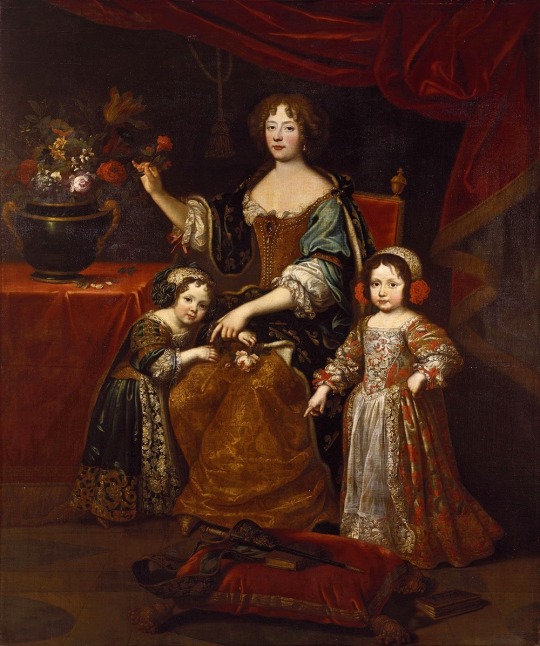
Liselotte von der Pfalz, Duchess of Orléans, with her two children Philippe and Elisabeth Charlotte, whom she wanted to experience the same Christmas festivities as she did as a child, c. 1678–1679 by Pierre Mignard.
A merry Christmas to all of you who celebrate (and of course an equally happy day to everyone who is currently celebrating a different holiday or none at all)!
Do you know that feeling of being nostalgic for the time when Christmas was a magical, festive season rather than a busy rush of obligations, get-together and worrying about presents, food and keeping all the relatives happy? You're not alone in that.
This year's Christmas post comes straight from the 17th century: on 11 December 1708, the Duchess of Orléans, more commonly known as Liselotte to her friends, family and posterity, recounted the magic of her favourite childhood Christmas, the last she spent in Hannover with her aunt Sophie (in the year 1660, I believe; Liselotte would have been 8 years old), to her daughter. Luckily, we still have the letter:
Ich weiß nicht, ob ihr auch jenes andere Spiel kennt, das man in Deutschland immer noch pflegt; man heißt es das Christkindl; dabei richtet man die Tische wie Altäre her und legt für ein Kind alle möglichen Sachen darauf, neue Kleider, Silber, Seidenbänder, Puppen, Naschereien und alles mögliche. Auf die Tische stellt man Buchsbäume, und auf jedes kleine Ästchen steckt man eine kleine Kerze: das sieht ganz wunderhübsch aus. [...] Ich erinnere mich, wie man in Hannover das letzte Mal das Christkindl zu mir kommen ließ: Man hat Schulbuben kommen lassen, die recht ordentlich eine Komödie spielen. Als erstes kommt der Stern und dann der Teufel und die Engel und schließlich der heilige Christ mit Petrus und den anderen Aposteln. Der Teufel schilt die Kinder und liest eine lange Liste mit ihren Untaten vor. Darauf sagt der Christ, daß er gekommen ist, sie zu beschenken, aber weil sie so böse sind, könne er nicht bei ihnen verweilen. Der Engel und der heilige Petrus bitten für sie und versprechen, daß sie sich bessern werden. Da vergibt Christus ihnen, und der heilige Petrus und der Engel führen sie zu den Tischen, die für sie bereitet sind [...]. Und als der heilige Petrus mich bei der Hand nahm -- es war ein kleiner Schuljunge mit einem falschen Bart --, da sah ich, dass er Krätze hatte, und daran merkte ich den Schwindel. [...] Und ganz bestimmt freue ich mich noch heute daran."
I don't know if you know that game which is still being maintained in Germany and called Christkindl [Christ Child]; they dress the tables, one for each child, in the style of an altar, and put all manner of things onto them, such as new clothing, silver, silk ribbons, dolls, sweets and much else. Onto the tables, they put little box trees, and on each little branch they place a little candle; it all looks very beautiful. I recall how they had the Christkindl visit me for the last time in Hannover: They had schoolboys come to act in a rather amusing comedy. At first, the star arrives, and then the devil and the angels and at last Christ with St. Peter and the other apostles. The devil scolds the children and reads a long list of their misdeeds to them. To this Christ replies that he has come to give them presents, but since they are so naughty, he cannot stay. The angel and St. Peter plead for them and promise that they will be good. Christ forgives them and St. Peter and the angel lead them to the tables which have been arranged for them [...]. And as St. Peter took me by the hand -- he was a little schoolboy with a false beard -- I remarked that he had scabies and saw through the sham. And without a doubt it still brings me joy until this day."
Sadly, this was to be the last Christmas of this sort Liselotte ever celebrated; her father, notoriously stingy to the point of arguing with his son's school at Heidelberg to lower the lunch fees citing poor young Karl's meagre appetite, was not one to indulge in grand festivities and when in France with children of her own, Liselotte, intent on bringing this favourite childhood tradition back for her own son and daughter, met with resistance from her husband. In a letter dated to January 1711 to Sophie von Hannover, the beloved aunt in whose home she had celebrated this favourite Christmas:
"hir weiß man gar nichts davon; wolte es introduciren, allein Monsieur sagte: 'Vous nous voulés donner de vos modes Allemandes pour faire de la despence, je vous baisse les mains'."
"They don't know nothing of it here; I wanted to introuce it, but Monsieur said 'You want to give us your German fashions [just to] create expenses, I kiss your hands."
So, young Philippe and Elisabeth Charlotte d'Orléans sadly never experienced the things that had made their mother's childhood Christmasses special, most crucially, they never had a Christmas tree, which would not arrive in France until after WWI.
To some degree, Liselotte's Christmas still exists materially; we know Christmas trees, presents still look very much the same, and there are holiday-themed plays both secular-ish and classic nativity plays put on by children, albeit luckily with a less harsh moral undertone.
But what's perhaps the most important, contrary to Philippe d'Orléans's fear of overspending is the aspect is to pass the joy of the festivities on, and share it with others because in the end, what's more precious than all the new clothes, silver, silk ribbons, dolls and sweets are the happy memories of the day.
Quotations taken from:
Dirk Van der Cruysse: Madame sein ist ein ellendes Handwerck. Liselotte von der Pfalz. Eine deutsche Prinzessin am Hof des Sonnenkönigs (1995), 4th edition 1997, p. 85 f.
#liselotte von der pfalz#philippe d'orléans#philippe ii d'orléans#elisabeth charlotte d'orléans#history#christmas#17th century
13 notes
·
View notes
Text

First Look Countdown to Christmas:
A Heidelberg Holiday
Cast: Ginna Claire Mason, Frederic Brossier
Synopsis: Heidi heads to the Heidelberg Christmas market to sell her hand-painted ornaments. While there she falls for a local artisan who helps her reconnect with her lost heritage.
Updated: poster added with premiere date and logo

#a heidelberg holiday#countdown to christmas#hallmark channel#first look#poster#ginna claire mason#frederic bossier#hallmark movies
9 notes
·
View notes
Text








A Heidelberg Holiday
2 notes
·
View notes
Text
2023 Christmas Watchlist (Thus Far)
1. The Nightmare Before Christmas: ✨✨✨✨✨
2. A Heidelberg Holiday: ✨✨
3. Dash and Lily: ✨✨✨✨✨
#whatyawatching#christmas#watchlist#holiday#winter#tnbc#Disney#the nightmare before christmas#a heidelberg holiday#hallmark#dash and lily#Netflix
2 notes
·
View notes
Text
Deutschribing Germany: regions
Baden-Württemberg (Baden-Württemberg)

Baden-Württemberg is divided into thirty-five districts (Landkreise) and nine independent cities (Stadtkreise), both grouped into the four administrative districts (Regierungsbezirke) of Freiburg, Karlsruhe, Stuttgart, and Tübingen. The capital city is Stuttgart.
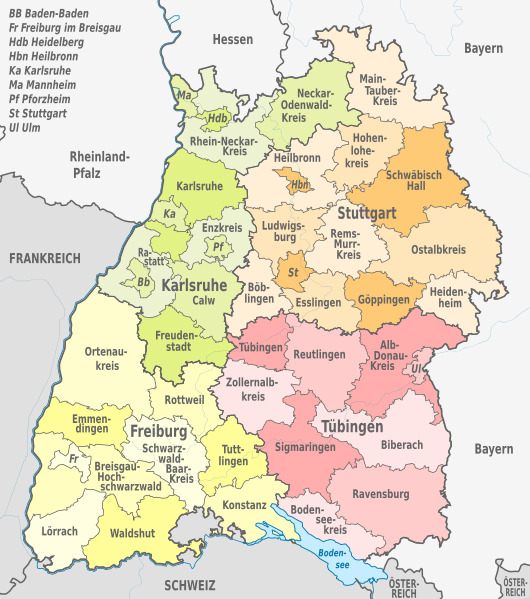
Climate
The predominant climate type is warm-summer humid continental, but the western part (Baden) has a subtropical highland climate. As a result, in most parts of Baden, the climate is warm almost all year round and summers are mostly dry, while winters are wet and foggy.
The rest of the state has more temperate temperatures, especially in summer. Areas of high elevation get snow frequently, and summers are rainier than in Baden.
Due to the climate differences, average annual temperatures range from 5 °C (41 °F) in the Black Forest to 13 °C (55 °F) in the subtropical areas.
Economy
Although Baden-Württemberg has relatively few natural resources compared to other German states, it is among the most prosperous and wealthiest regions in Europe.
The state is known for its strong industries, including car manufacturing, electrical engineering, and mechanical engineering. It hosts the headquarters of some of the largest German companies, such as Borsch, Mercedes-Benz Group, Porsche, and Schwarz Group (owner of Kaufland and Lidl).

Baden-Württemberg is also a popular holiday destination, including a variety of sights like the residential court towns of Ludwigsburg and Karlsruhe, the spas of Baden-Baden, the medieval architecture of Ulm, the Black Forest, and the traditional university towns of Heidelberg and Tübingen.
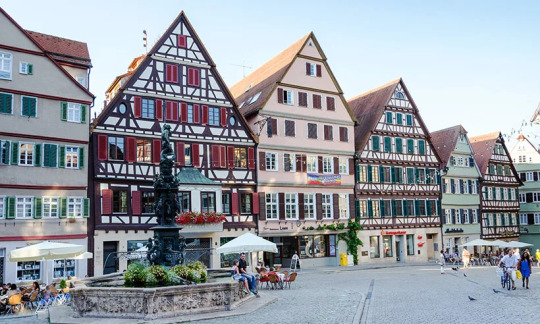
Famous people
Alena Gerber - model, actress, and TV host
Anja Jantschik - journalist and writer
Anne-Sophie Mutter - violinist
Ayla - producer and DJ
Frank Christoph Schnitzler - actor, artist, and musician
Frederik I - Holy Roman emperor
Friedrich Wilhelm Schnitzler - landowner, business manager, and politician
Jens Weidmann - economist
Sophie Weber - singer and younger sister of Mozart's wife Constanze
Walter Haeussermann - scientist
Gastronomy
There are two distinct regional cuisines: those of Baden and Swabia. The cuisine of Baden is considered one of the best regional cuisines in Germany and is based on fruit, herbs, vegetables, game, poultry, fish, smoked products, wine, and beer. It has many influences from Alsace and Switzerland. Specialties include Flammkuchen (pizza with thin crust) and Schäufele (pig's shoulder meat).
Swabian cuisine has a reputation for being rustic but rich and hearty. It is characterized by fresh egg pasta, soups, sausages, broths, and sauces. The most famous specialties are Maultaschen (meat and spinach-filled dumplings, either fried or served in broth) and pretzels.

Schäufele
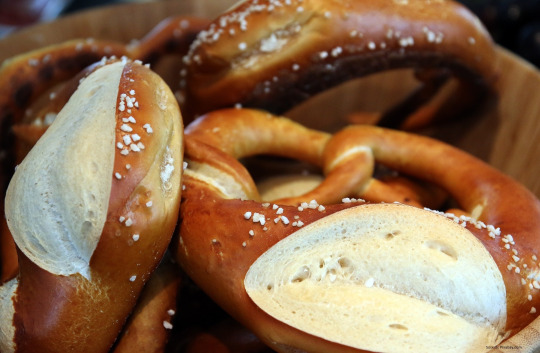
Brezel
History
Baden-Württemberg was formed from the historical territories of Baden, Prussian Hohenzollern, and Württemberg.
100 - Roman invasion of Württemberg
3rd century - the Alemanni force the Romans to retreat west
496 - Frankish invasion
915-1313 - Duchy of Swabia
1083-1495 - County of Württemberg
1112-1803 - Margraviate of Baden
1278-1805 - Further Austria
1495-1803 - Duchy of Württemberg
1500-1808 - Swabian Circle
16th century - Protestant Reformation
1524-1525 - German Peasants' War
1618-1648 - Thirty Years War
1803-1806 - Electorate of Baden; Electorate of Württemberg
1805-1918 - Kingdom of Württemberg
1806-1918 - Grand Duchy of Baden
1918-1945 - Republic of Baden
1945-1946 - South Baden
1945-1952 - Württemberg-Baden
1945-1952 - Württemberg-Hohenzollern
1946-1952 - Baden
1951 - vote on the union of Baden and Württemberg
1952 - State of Baden-Württemberg
1956 - opponents of the merger sue and win
1970 - vote on the restoration of the state of Baden fails
Languages
Two dialect groups of German are spoken in Baden-Württemberg: Alemannic and Franconian dialects. These include East Franconian, High Alemannic, Low Alemannic, Rhine Franconian, South Franconian, and Swabian.
Monuments and landmarks

Baden-Baden

Maulbronn Monastery Complex
1 note
·
View note